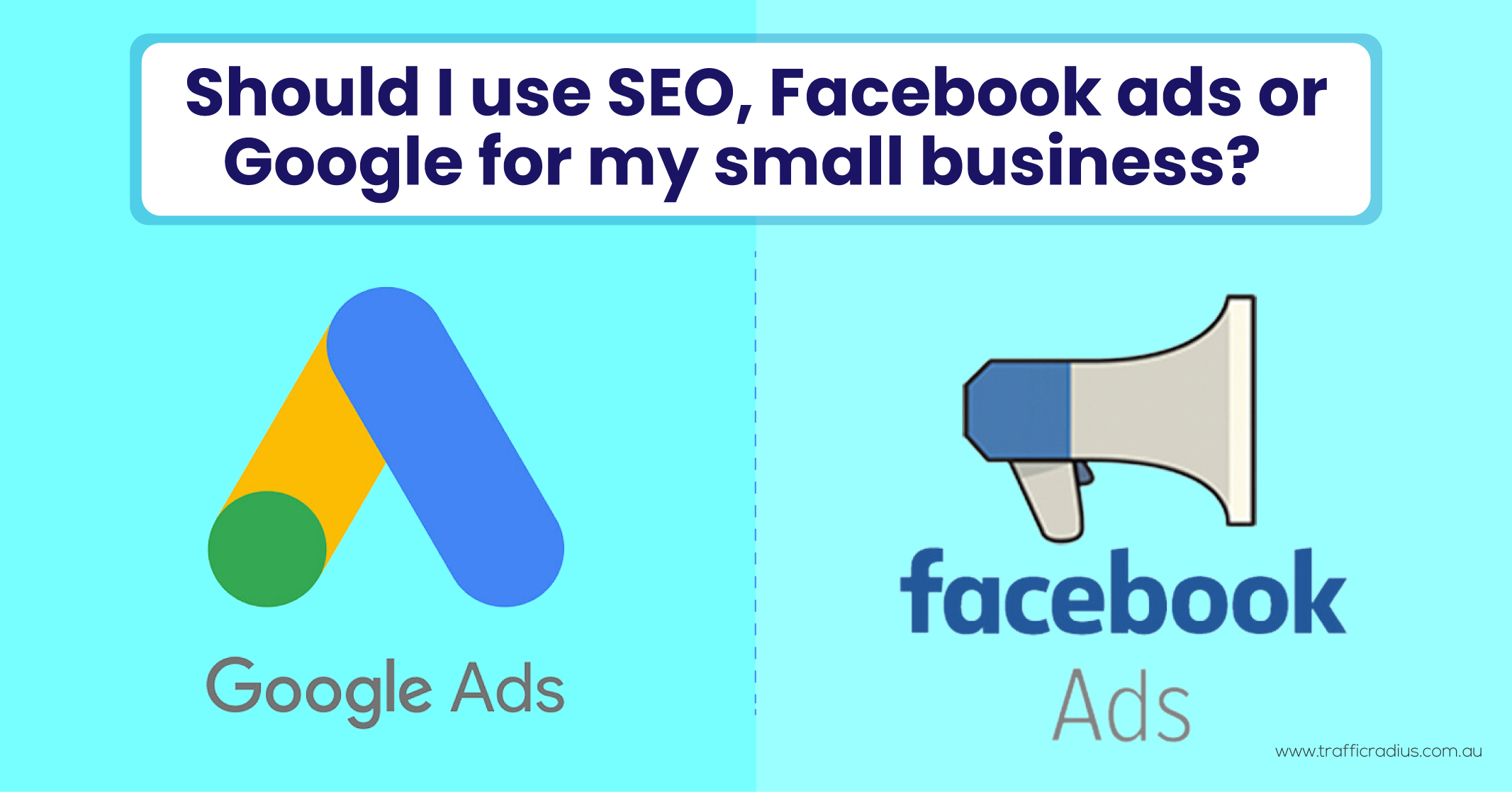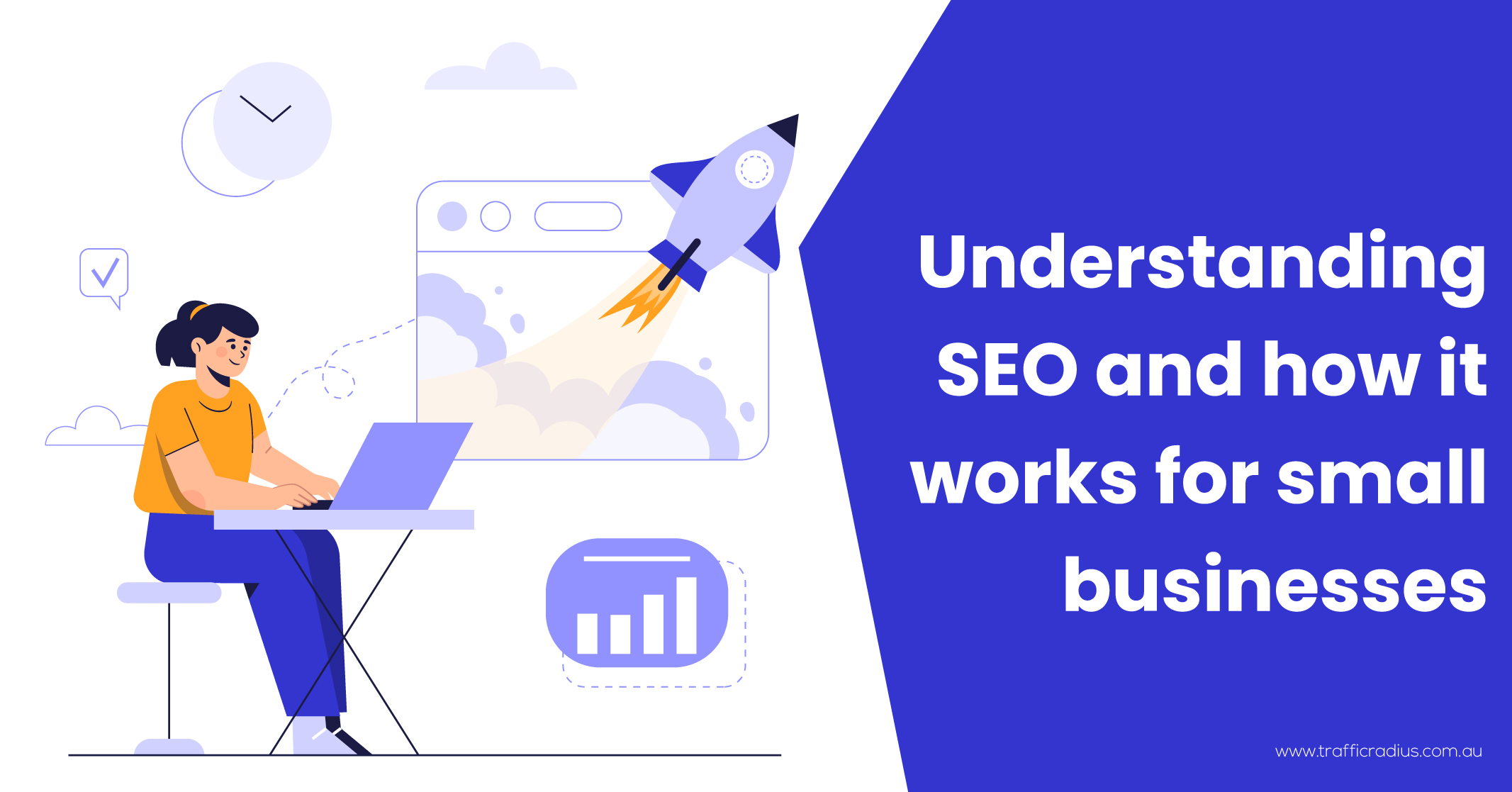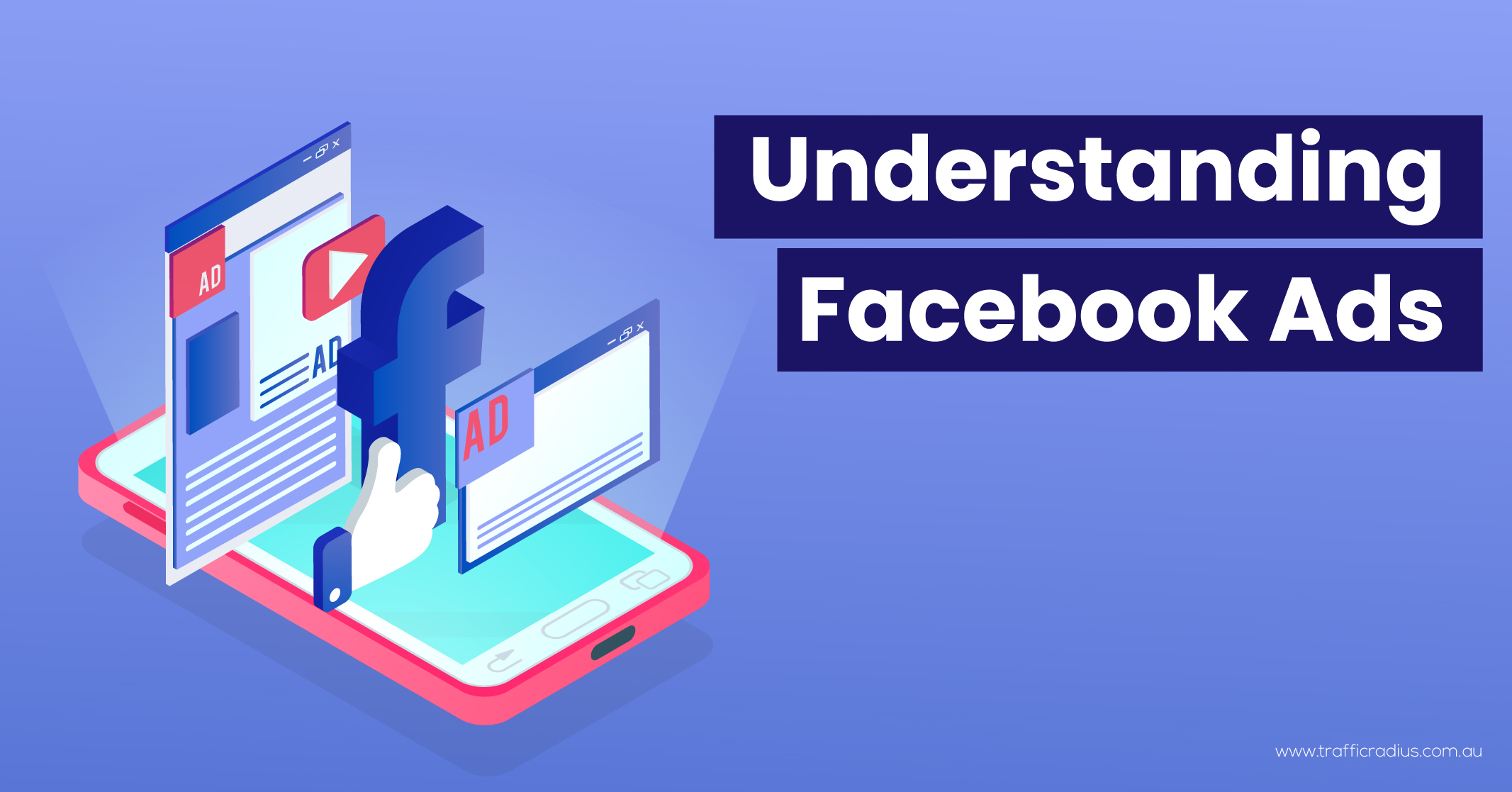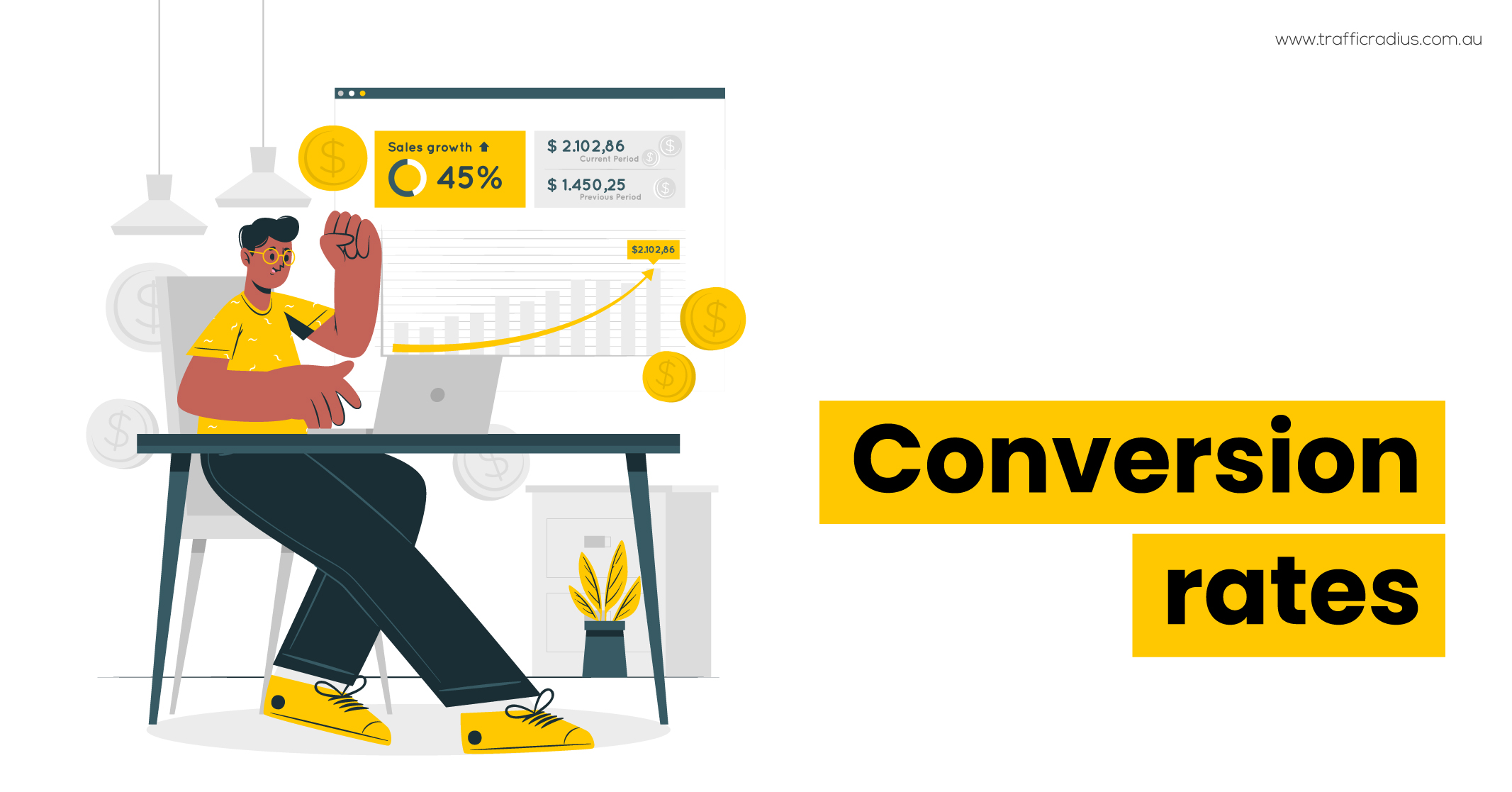I hope you enjoy reading this blog post.
If you want to get more traffic, Contact Us

Click Here - Free 30-Minute Strategy Session
Be quick! FREE spots are almost gone for this Month. Free Quote

Small business owners today have a myriad of marketing options. It’s really difficult to know which to choose. Among the most commonly used – and the most impactful – are SEO (search engine optimisation), Google ads, and Facebook ads.
But how can you choose? Will SEO will be more effective than Facebook ads? Or Google ads? Or are ads better because they’re more targeted? It’s tempting to believe that SEO = free and therefore the best choice, but doing SEO well without the help of a marketing agency is difficult. At least if you have ambitious growth plans.

Click Here – Free 30-Minute Strategy Session
Be quick! FREE spots are almost gone for this Month
Each of these strategies has its own benefits and drawbacks, and it’s crucial to understand them before deciding where to invest your hard-earned marketing budget. There’s no one-size-fits all answer, so real understanding is important.
This article provides a comprehensive comparison of each of these three tools. And how they can boost your online visibility and your revenue – whether you’re new in business, or well-established.

Ideally, SEO should be a vital part of pretty much any digital marketing strategy. It aims to improve your website’s visibility in organic search results, so when people look for businesses like yours on Google, they find you, not your competitors.
By optimising your site with relevant keywords, creating high-quality blogs and page copy, and making sure your site is quick to load and easy to use, you can significantly improve your position in search results.
For small businesses, SEO can provide an opportunity to compete with bigger players on level terms. Once your site ranks high in search results, it can maintain its position over time, providing consistent visibility, even over larger competitors. Secondly, it helps build credibility. Websites that appear on the first page of Google are often perceived as more trustworthy by users, so they’re more likely to choose you. And it’s cost-effective. Unlike paid advertising, organic SEO does not require you to pay for clicks, making it a sustainable strategy for small businesses with tight budgets.
But SEO isn’t without its drawbacks. It often requires a significant investment of time and effort before you see results. If you choose to do your own SEO, rather than using an agency, you might find that the amount of work involved quickly becomes unsustainable.
And SEO is an ongoing process. Google’s algorithms constantly evolve, which means you need to keep on top of what’s happening, and make regular adjustments to your strategy. Without professional guidance, it can be challenging to navigate all this as a small business.
Google As is a powerful online advertising platform that can allow you to come top of the search results, even if your SEO isn’t working yet. Any time you search for something online, the first few results you’ll see will be ads – and there’s a good chance you’ll click on those first.
Google Ads can deliver immediate results. Unlike SEO, where you need time and effort to build up to good organic rankings, paying for Google Ads means you can put your business at the top of search results instantly. For this reason, we often run Google Ads with our clients at Traffic Radius when they first start working with us – so they see fast results while we get their SEO performance up.
Then there’s Google Ads’ ability to provide precise targeting options. This means you can reach your potential customers based on location, demographics, and even their previous search behaviour. So if you know that your customers often search for a particular competitor before they find you, you can run ads to target those people.
Another benefit is that you get measurable results, with comprehensive analytics that make it really easy to track the effectiveness of your campaigns and tweak them if needed.
The biggest drawback of Google Ads is the potential cost. You’ll pay every time someone clicks on your ad, even if they don’t buy. This can quickly drain your budget if your ads aren’t bringing in the right people. And though it seems like a quick option, setting up and optimising campaigns does require expertise and can be time-consuming.

Facebook Ads is – of course – Facebook’s own advertising platform. It allows businesses to display ads to a specific audience based on demographics, interests, and behaviours, providing a unique opportunity for you to reach your perfect potential customers with highly personalised content.
The biggest strength of Facebook Ads is its vast user base and the depth of its user data. If you’re a Facebook user yourself, you’ll no doubt have seen ads that are so well targeted at you that they feel spooky. You’ve probably seen ads that are targeted at you based on websites you’ve read, for example. And Facebook’s detailed analytics means businesses can easily monitor and adjust campaigns to keep making them even more relevant and targeted.
But Facebook Ads can be complex to navigate. Setting up and optimising campaigns requires a certain level of expertise to do it well. Many small businesses get it wrong – as you may well have seen when you’ve been shown ads on Facebook that have nothing to do with your interests.
Getting it wrong can be very costly. Many small businesses have lost money trying to run their own Facebook ads. We’ve worked with many clients who’ve been burned trying to DIY before they come to us.
SEO, Google Ads, and Facebook Ads each offer their own benefits – but none of them is a perfect marketing solution.
In terms of cost-effectiveness for small businesses, many assume SEO is the winner. But this isn’t necessarily the case.
SEO is a long-term investment and not a quick fix. It could give you substantial returns if it’s successful in improving your website’s organic search visibility. But succeeding can be hard for many, and much depends on the complexity of your website and competition in your industry. Most businesses will find that they need to invest in support from a marketing agency to make SEO work for them, which means there are upfront costs.
However, it can lead to high ROI as organic traffic is usually more qualified than paid traffic, which leads to higher conversion rates on average.
Google Ads operates on a pay-per-click model, with costs averaging $2.69 per click. This can add up quickly, but the immediate visibility and precise targeting can make it worth the investment for many businesses.
Facebook Ads typically offer a lower average cost per click ($1.72) and an average cost per action (e.g – a purchase or a sign up to your email list) of $18. The platform’s extensive user base and advanced targeting capabilities can result in strong ROI, particularly for B2C businesses. If you’re a B2B business, you might find that Facebook is less valuable for you – unless your main audience is freelancers or micro businesses.
It can be easy to reach lots of people if you have a big marketing budget, but that doesn’t always mean that they’re engaged. And if they’re not engaged, they naturally won’t buy from you.
Because SEO focuses on improving your website’s visibility in organic search results, it tends to lead to high engagement relative to ads. It works on the basis of the things people naturally search for and are interested in, so you’d expect high levels of engagement. Plus, people tend to trust organic results over paid ads.
SEO reach is also usually very good, because the majority of online experiences begin with a search engine. Think about how many times you use Google each day…
Facebook has 2.8 billion active users, which means you’ll get potentially huge reach if you use Facebook Ads. While most of those users won’t be your customers, the fact that you can use the platform’s excellent targeting capabilities to choose who sees your ads means engagement can be high. But if you don’t know how to use targeting properly, you’re likely to see much lower engagement.
Google Ads gives you access to the best of both Facebook and SEO in some ways. You get access to billions of users – and there are 3.5 billion searches made every day on Google. A pay-per-click ad on Google can drive high engagement, as it will appear at the exact moment when someone is actively searching for your products or services. On top of that, you get strong targeting – not quite to the same degree as Facebook, but enough that you can reach ideal customers relatively easily.

Reach and engagement are important – but the metric most small businesses really care about is conversion rate.
SEO isn’t designed to lead directly to a conversion in the way that ads are. But it does significantly impact conversions by improving your organic visibility. Higher search rankings result in increased website traffic, and as long as your site is optimised for conversion, that traffic means more customers and revenue.
Facebook Ads has an average conversion rate of 9.21% across all industries – though of course, it might be higher or lower for your industry. Bear in mind though, that a conversion isn’t necessarily a purchase – it might mean someone signing up for your email list. Which means you’ll still have some work to do to see a return on your investment.
Google Ads has an average conversion rate of 4.40% . While this is lower than Facebook, it’s worth remembering that people who see your Google ad are actively searching for businesses like yours. Which means you may get higher-quality leads.
The biggest issue with hiring an agency can be budget. You might be unsure whether you can afford an agency, and be worried that you’ll end up paying more than you get back in revenue.
But if you choose the right agency, the long-term return on your investment can be substantial. A good agency will have the expertise to optimise your marketing spend across each of these 3 channels, so you’re using the right one at the right time. They’ll also usually have advanced tools and technologies that can optimise your ads or website that may be too expensive for you to buy yourself.
Then there’s the fact that understanding and reaching your target audience is a complex task. Agencies bring to the table extensive experience in market research and audience segmentation. They can accurately identify your ideal customers, understand their online behaviours, and devise strategies to reach them effectively. They’ll know how to balance your use of SEO, Google Ads, and Facebook Ads to get the best possible results.
And every industry has its unique characteristics and challenges. A marketing agency with experience in your sector might have worked with businesses just like yours before. And will know exactly how to achieve success.
Importantly, they’ll be able to tell you whether Google Ads, Facebook or SEO is best for you – or whether you should be looking to combine all three.
To summarise:
It’s impossible to say whether you should use Google Ads, Facebook or SEO. Most businesses could benefit from using at least two, and often all three of these tools.
Which is right for you will depend on:
To get a free personalised assessment of which one you should use, and a guide to costs, get in touch with us today.

LEAVE A REPLY